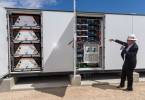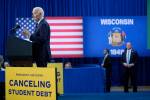An everlasting federal subsidy
As part of his "New Deal" program of make-work federal expenditures, President Franklin D. Roosevelt way back in 1935 created the Rural Electrification Administration to bring electricity to America's impoverished, isolated farms. And, partly because they were smart enough to set up customer-owned co-operatives, it worked.
"More than 70 years later, the goal of providing electricity to rural areas has long been accomplished," The Washington Post reported this week.
Way back in 1997, the government reported, "Today the Rural Electrification Administration has largely achieved its objective of providing electric and telephone service to rural areas in the United States. Nearly 99 percent of all the farms in America are electrified, with REA-financed loans, cooperatives serving almost 25 million consumers. In addition, 95 percent of all farms today have telephone service."
Finally, a federal program that accomplished its goal so well it can be quietly shut down.
Yeah, right.
"Rather than declare the mission accomplished and disband the expensive subsidy program, Congress continued it and allowed it to become even more generous," the Heritage Foundation reported in 2004.
"A Depression-era program to bring electricity to rural areas is using taxpayer money to provide billions of dollars in low-interest loans to build coal plants even as Congress seeks ways to limit greenhouse gas emissions," The Post reported this week. "That government support is a major force behind the rush to coal plants, which spew carbon dioxide that scientists blame for global warming," the Post concluded (without specifying which "scientists").
The beneficiaries of that government largesse -- the nation's rural electric cooperatives -- plan to spend $35 billion to build conventional coal plants over the next 10 years, "enough to offset all state and federal efforts to reduce U.S. greenhouse gas emissions over that time," The Post reports.
All with taxpayer support.
The Office of Management and Budget, quite sensibly, wants to end loans for new power plants and limit loans for transmission projects to the most remote areas. After all, if coal plants are cost-effective -- and they still are, absent more government meddling -- private entrepreneurs will be happy to build them in anticipation of future profits. Where does the Constitution authorize Washington to butt in?
"But the powerful National Rural Electric Cooperative Association deployed 3,000 members on Capitol Hill last week to push Congress to keep the program intact," the Post reports.
Now, the notion that banning the cost-effective coal generation of electricity in America could have any perceptible impact on global climate requires the willful suspension of quite a lot of rudimentary science and mathematics. Ice core data show that higher carbon dioxide concentrations in the atmosphere follow periods of global warming, not the other way around. And the contribution of human fossil fuel consumption to atmospheric CO? loads is so minimal that even the extinction of mankind tomorrow -- not a bad idea, in the eyes of many Greens -- would be unlikely to have a substantial impact on global temperatures.
But the fact remains that Washington's politicians are trying to please their Green constituents by improvising some song and dance about "limiting greenhouse emissions." So, given that the REA and its successor, the Agriculture Department's Rural Utilities Service, finished their job years ago, why not simply shut them down, saving all those billions in low-interest loan subsidies?
If the boys in Washington can't even stop subsidizing coal-fired plants that provide below-market power to such "impoverished rural" areas as Dallas-Fort Worth, Northern Virginia and Branson, Mo., is there any tax-funded program that can ever end?























